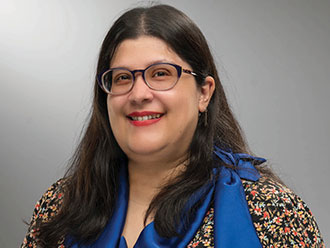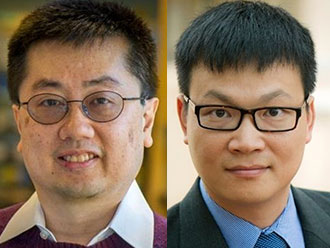Appointments
Landscape architecture Professor Diane Jones Allen was named a 2021-22 fellow with Harvard University’s Dumbarton Oaks Research Institute, which supports the pursuit of the humanities, focusing on Byzantine or Pre-Columbian art and on garden and landscape history.
The American Institute of Aeronautics and Astronautics named Erian Armanios, Mechanical and Aerospace Engineering Department chair, as a fellow.
Marion J. Ball, the Raj and Indra Nooyi Endowed Distinguished Chair in Bioengineering, was named a distinguished fellow of the American College of Medical Informatics. She was one of four individuals recognized during the 2021 Annual American Medical Informatics Association Symposium.
Marco Brotto, director of the Bone-Muscle Research Center and the Ph.D. in Nursing program, will serve as a U.S. Bone and Joint Ambassador with the American Society of Bone and Mineral Research.
The Association of Computing Machinery (ACM) named Gautam Das, associate dean for research in the College of Engineering, as a fellow. He is the first faculty member at UTA to receive the honor and one of only three ACM fellows on the faculty of universities in North Texas.
The International Shock Wave Institute selected Frank Lu, an aerospace engineering professor, as a distinguished fellow in its inaugural class. The honor was based on his lifetime professional contributions in the domain of shock wave research.
Visiting Research Scholar Katie Moylan was selected as a Marie Curie Global Research Fellow. During her fellowship, she will research tribal radio content and production practices in urban and rural contexts in the U.S.
Kamesh Subbarao, professor in the Mechanical and Aerospace Engineering Department, is the University’s first faculty member to be named a fellow of the American Astronautical Society.
The International Society for Optics and Photonics named bioengineering Professor Baohong Yuan a fellow in recognition of his outstanding contributions to developing high-resolution fluorescence imaging technologies in deep tissue.
Grants
Ali Abolmaali, chair of the Civil Engineering Department and the Tseng Huang Endowed Professor, is leading a $2.8 million Texas Department of Transportation project that will scan Texas roads to determine their condition and remaining service life.
Dereje Agonafer, Presidential Distinguished Professor, is co-leading a project with Texas A&M’s Yassin A. Hassan to conduct experiments and simulations of liquid metal heat pipes for micro nuclear reactors. The Nuclear Regulatory Commission is funding their work.
The National Institutes of Health awarded a five-year, $1.8 million grant to Joseph Boll, assistant professor of biology, to identify and inhibit the defense mechanisms of Acinetobacter baumannii, a pathogen that thrives in hospitals and clinical settings.
Mechanical engineering Associate Professors Alan Bowling and Hyejin Moon, along with bioengineering Professor and Chair Michael Cho, are developing a technique to better predict how stem cells develop into specific cells, such as bone or skin. They received a two-year, $416,000 grant from the National Institutes of Health for the project.
Associate Professor Animesh Chakravarthy and Professor Kamesh Subbarao, both from the Mechanical and Aerospace Engineering Department, received $333,000 in funding from Galaxy Unmanned Systems LLC to develop controls that will allow airships to operate autonomously, with an eventual objective of enabling urban air mobility.
An interdisciplinary team of scientists led by physics Assistant Professor Yujie Chi is using a grant from the National Institutes of Health’s National Cancer Institute to develop a new system designed to make the use of radiation in medical procedures safer for patients. Co-investigators include Qiming Zhang, professor of physics, and Zui Pan, associate professor in the College of Nursing and Health Innovation.
Computer science and engineering Professor Gautam Das and Assistant Professor Shirin Nilizadeh received a National Science Foundation grant to explore how to identify and characterize discrimination in web database applications and to enhance fairness through design and transparency.
Nick Fang, associate professor and Robert S. Gooch Endowed Faculty Fellow in Civil Engineering, is using a Texas Water Development Board grant to develop an effective guidance manual for a specific flood early-warning system tailored for communities in Texas.
Sharareh “Sherri” Kermanshachi, associate professor of civil engineering, received $946,000 from the Texas Department of Transportation to address workforce development needs and technologies that could result in safer work-zone environments.
Mechanical engineering Associate Professor Daejong Kim received a three-year grant worth nearly $1.5 million from the Office of Naval Research to continue his development of foil bearings for small engines used in aerospace applications.
Computer science Assistant Professor Jacob Luber earned a $2 million grant from the Cancer Prevention and Research Institute of Texas to create a database that contains every publicly available cancer dataset from the National Cancer Institute.
The Department of Defense awarded a $1.5 million grant to an Aerodynamics Research Center team to examine how lasers can be utilized to destroy hypersonic threats to the United States. Luca Maddalena, professor in the Mechanical and Aerospace Engineering Department and director of the center, is principal investigator.
Karen Jo Matsler, assistant professor in practice and master teacher in the College of Science’s UTeach program, is using a $998,448 grant from the National Science Foundation to launch a national training program for high school teachers on how to incorporate quantum physics into their math, science, and engineering curricula. Ramon Lopez, UTeach co-director and professor of physics, is co-principal investigator on the project.
Kevin Schug, Shimadzu Distinguished Professor of Analytical Chemistry, received a three-year, $325,702 grant from the National Science Foundation to design an application that will make the Nexera UC, a machine that automates chemical-compound sample preparation and analysis, easier to use.
Cesar Torres, assistant professor in the Computer Science and Engineering Department, received a National Science Foundation grant for his work using machine learning and artificial intelligence techniques to identify when a person is falling out of “flow.”
Electrical engineering Professor David Wetz is part of a team working to develop a safer battery to power drones used to inspect mines for hazards. The project is funded by the Alpha Foundation for the Improvement of Mine Safety and Health Inc.
Xinbao Yu, associate professor of civil engineering, received nearly $636,000 from the Texas Department of Transportation to test a geothermal bridge de-icing system that he and his team designed on an in-service bridge to see how it performs under operational conditions.
Awards
Three professors from the Department of Chemistry and Biochemistry were included in The Analytical Scientist magazine’s list of the top 100 scientists in the world: Daniel Armstrong, R.A. Welch Distinguished Professor in Chemistry; Purnendu “Sandy” Dasgupta, Hamish Small Chair in Ion Analysis; and Kevin Schug, Shimadzu Distinguished Professor of Analytical Chemistry.
Myrtle Bell, associate dean for diversity, racial equity, and inclusion in the College of Business and a professor of management, and Doug Garner, coach of the Movin’ Mavs wheelchair basketball team and assistant director for adaptive sports and recreation, were named winners of Dallas Business Journal’s inaugural Leaders in Diversity Awards for 2021.
The Dallas Observer named Erin Carlson, associate clinical professor and director of Graduate Public Health programs in the College of Nursing and Health Innovation, the Best Public Health Expert in its 2021 “Best of Dallas” list.
John D. Gonzalez, chair of graduate nursing programs, was selected as a recipient of the DFW Great 100 Nurses distinction.
Sharareh “Sherri” Kermanshachi, associate professor of civil engineering, received the Rosa Parks Leadership Diversity Award from the Women’s Transportation Seminar’s Greater Dallas/Fort Worth chapter for her research and leadership in the field.
Mark Lamster, associate professor of practice, was honored by the Dorothea and Leo Rabkin Foundation as one of eight recipients of the Rabkin Prize, given to “essential visual art journalists.” He is the first recipient who writes principally about architecture.
The Association for Gerontology Education in Social Work awarded its Faculty Achievement Award to social work Assistant Professor Kathy Lee.
Kenneth Roemer, a Distinguished Scholar Professor and longtime faculty adviser to the Native American Student Association, won the unpublished book manuscript contest at the Mayborn Literary Nonfiction Conference. His work, “Allies to Indian Country,” is a reflection on his lifetime of allyship with the Native American community.
Publications
In a study published in the journal Ecological Modelling, a team of researchers led by Benito Chen-Charpentier, professor of mathematics, devised a mathematical model to calculate the minimum habitat size for endangered plant species.
In a study for the Journal of Biological Chemistry, Clay Clark, chair and professor of biology, explored the ancestry of a class of enzymes responsible for killing cells. Known as effector caspases, they provide insight into the process of cell death and how it can be manipulated in disease states.
Piya Ghose, assistant professor of biology, published a collaborative study in the journal Development detailing her team’s discovery that a gene that represses gene expression and is a master regulator of the fate of cells is important in the process of novel cell death.
Marketing Associate Professor Fred Miao published a paper in the Journal of Marketing on how digital avatars can replace a sales force and customer service employees at a fraction of the cost.
Katrina Pound, postdoctoral researcher, was lead author on a study showing that if humans continue as they are now regarding climate change, many economically important species could be driven to the brink of extinction within 50 years. Biology Associate Professor Sophia Passy and alumnus Chad Larson were co-authors on the paper, published in Global Ecology and Biogeography.
A multi-institutional team that includes Ziyad Ben Taleb, assistant professor of kinesiology, published a paper in Pediatrics examining the impact of blunt use on factors such as respiratory function and brain development in adolescents.
Associate Vice President for Research Jon Weidanz authored a perspective regarding the development of cancer immunotherapies for the journal Science. He argues that emerging protein-based immunotherapies could lead to highly effective “off-the-shelf” cancer treatments.
An international, multidisciplinary team that includes Kenneth Williford, associate professor and chair of philosophy and humanities, and Perry Fuchs, professor and chair of psychology, published a paper in the journal Philosophical Psychology concluding that while fish lack certain regions of the brain typically associated in humans with processing pain, this does not offer definitive proof that they don’t experience painful events.


